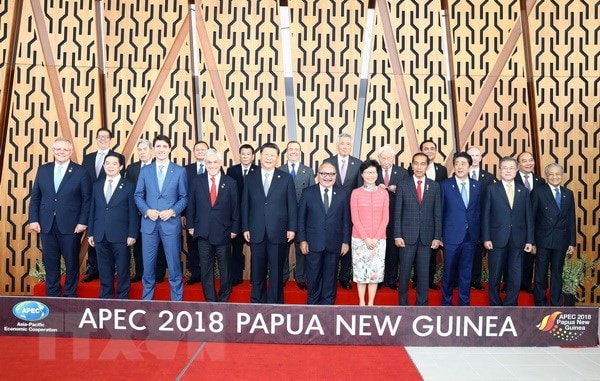For the first time in history, APEC leaders did not issue a joint statement.
Leaders of the 21 APEC member economies failed to issue a joint statement amid deep divisions between the US and China over trade and investment issues.
 |
| APEC leaders pose for a group photo. Photo: Thong Nhat/VNA |
Leaders of the 21 member economies of the Asia-Pacific Economic Cooperation (APEC) forum on November 18 failed to issue a joint statement at the 26th summit in Papua New Guinea, amid deep divisions between the world's two leading economic powers, the US and China, on trade and investment issues.
This is the first time in history that the APEC Summit has failed to issue an official joint statement.
Speaking to the press after the conference ended, Papua New Guinea Prime Minister Peter O'Neill said he would issue a chairman's statement on behalf of the economies on November 18. According to him, at the conference, economic leaders had disagreements on reforming the World Trade Organization (WTO).
Earlier, Papua New Guinea Foreign Minister Rimbink Pato also said that conflicts over regional visions prevented APEC leaders from issuing a joint statement. Meanwhile, Canadian Prime Minister Justin Trudeau said different views, especially on trade-related factors, prevented economies from issuing a joint statement.
Trade disputes and competition for influence in the Pacific region between the US and China have cast a shadow over the APEC Summit, held for the first time in Papua New Guinea.
In a speech at the conference's opening day on November 17, Chinese President Xi Jinping issued an implicit warning aimed at President Donald Trump's "America First" policy, saying that countries pursuing protectionism are "doomed to failure."
In response to the escalation of trade tensions between the two countries, the Chinese President said: "History has shown that confrontation, whether in the form of a cold war, a hot war or a trade war, will not produce winners. Attempts to build barriers and cut off economic ties are against economic laws and the trend of history."
However, US Vice President Mike Pence - who spoke at the forum right after Chinese President Xi Jinping - responded that "the United States will not end tariffs until China changes its ways."
Mr. Pence also announced that the US administration was prepared to “more than double” tariffs on Chinese goods. In addition, he also criticized China’s Belt and Road Initiative.
However, Chinese President Xi Jinping and Vice President Mike Pence held talks on the evening of November 17. Speaking to the press, Mr. Pence affirmed that he had held talks twice with President Xi Jinping within the framework of the APEC summit and the two sides had frank dialogues.
Relations between the US and China have deteriorated in recent months after both sides imposed billions of dollars in tit-for-tat tariffs on each other, with experts warning that the trade confrontation between the world’s two largest economies would have dire consequences for the global economy.
APEC includes 21 member economies: Australia, Brunei, Canada, Chile, China, Hong Kong (China), Indonesia, Japan, South Korea, Malaysia, Mexico, New Zealand, Papua New Guinea, Peru, Philippines, Russia, Singapore, Taiwan (China), Thailand, the United States and Vietnam.
APEC leaders are meeting in Papua New Guinea on November 17-18 amid criticism from the United States, Japan and other economies that China is using market-distorting policies, such as intellectual property rights violations and industrial subsidies.
Meanwhile, the "America First" policy of the Trump administration has caused global concerns, especially its focus on pursuing bilateral agreements and opposing multilateral trade agreements and organizations./.

